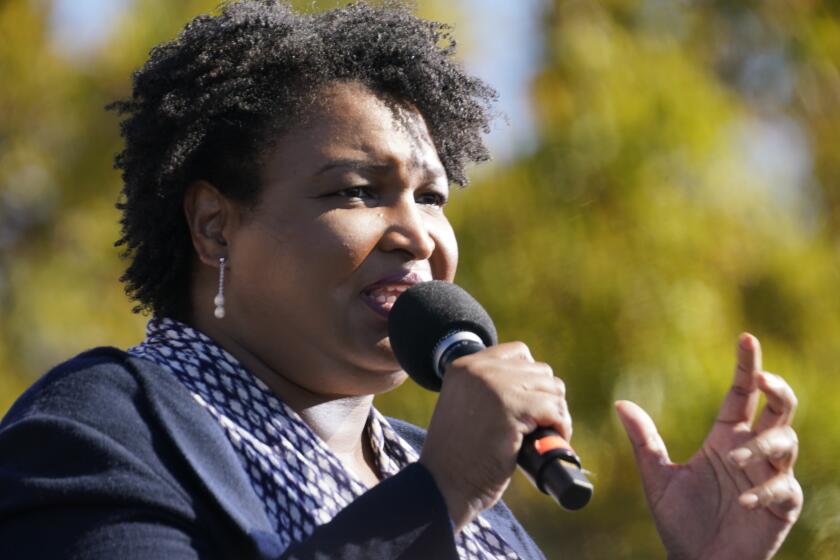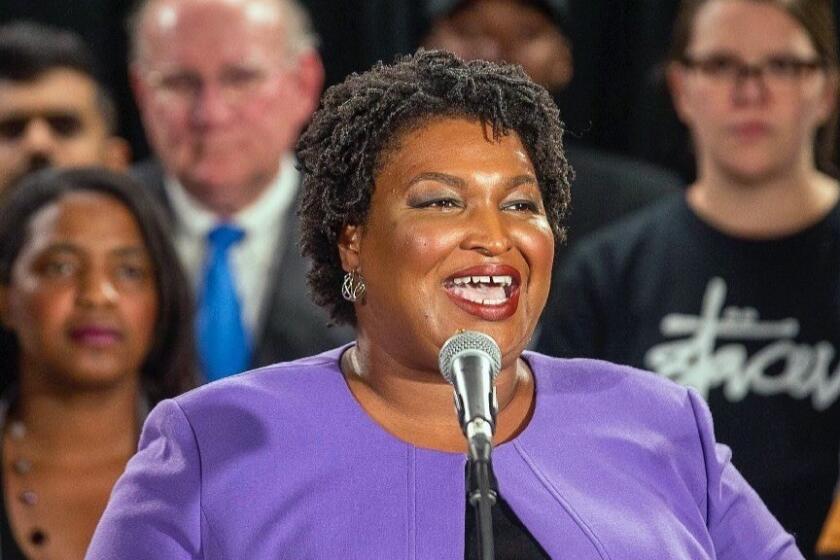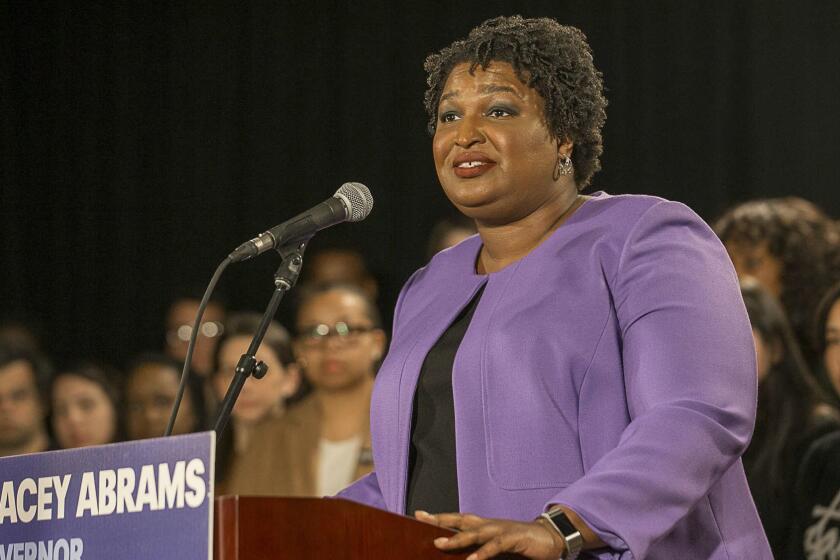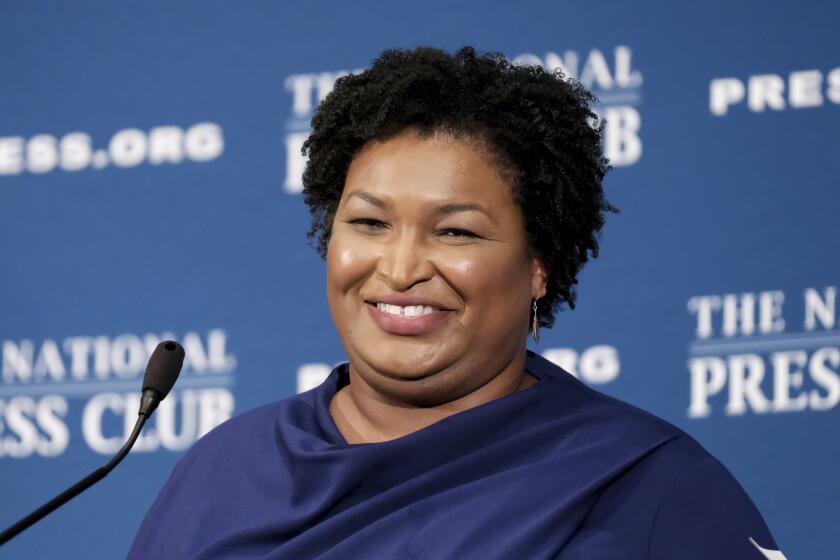Stacey Abrams launches second campaign for Georgia governor
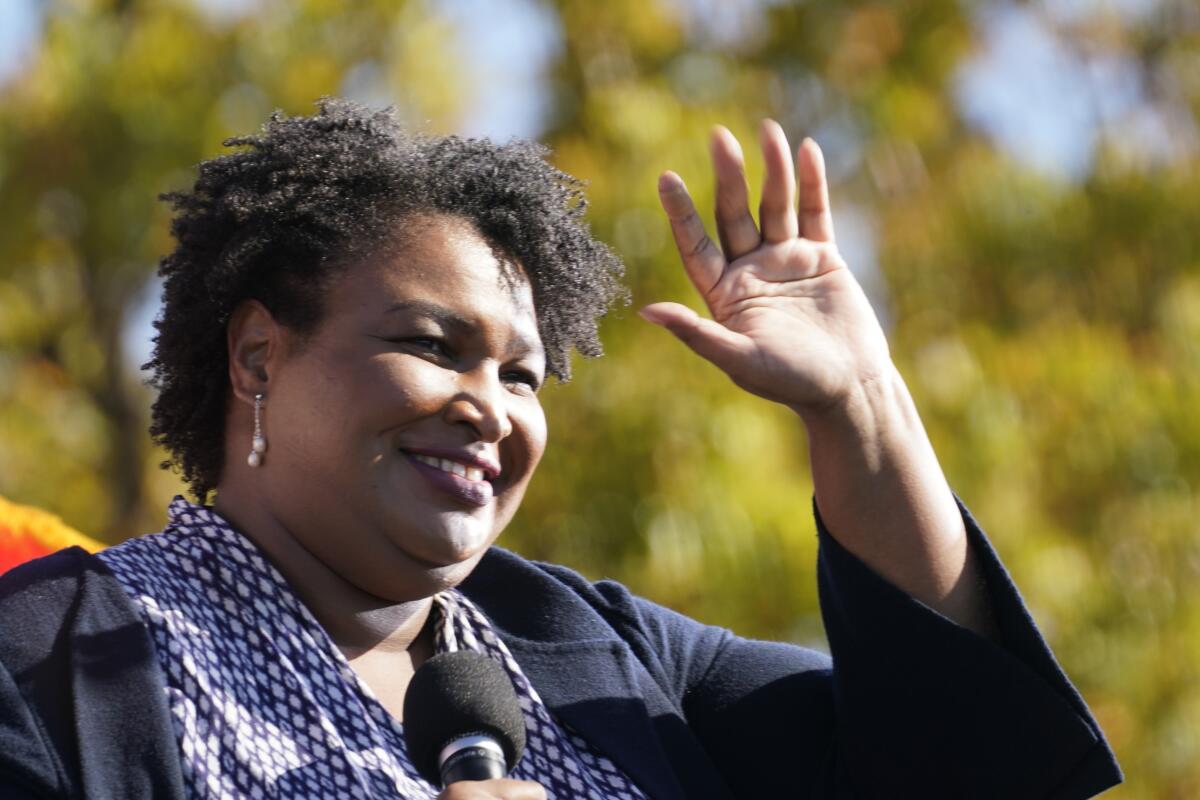
- Share via
ATLANTA — Stacey Abrams, the Georgia Democrat and leading voting rights activist, said Wednesday that she was launching another campaign for governor, which would make her the nation’s first Black woman to lead a state.
Without serious competition in a Democratic primary, the announcement sets up a likely rematch between Abrams, 48, and incumbent Republican Gov. Brian Kemp. Their 2018 contest was one of the most narrowly decided races for governor that year and was dominated by allegations of voter suppression, which Kemp denied.
Abrams’ strong showing convinced national Democrats that Georgia should no longer be written off as a GOP stronghold. Her performance and subsequent organizing convinced Joe Biden to invest heavily in the state in the 2020 campaign, and he became the first Democratic presidential candidate to capture it since 1992. The party later won a narrow Senate majority after victories in two special elections in the state.
The 2022 governor’s race will test whether those gains were a one-time phenomenon driven by discomfort with then-President Trump, or marked the beginning of a more consequential political shift in a rapidly growing and diversifying South.
In a state where Democrats often sought — and failed — to win power by relying on Black voters and appealing to older white moderates, Abrams ran in 2018 as an unapologetic progressive. She embraced expanding Medicaid access, something a series of Republican governors have refused to do, and supported abortion rights.
Stacey Abrams gets results, from registering 800,000 voters and giving Democrats the Senate to writing a gripping thriller, ‘While Justice Sleeps.’
Georgia remains narrowly divided, and voters often reject the president’s party during the first election of their presidency. But Abrams believes that in abandoning nods at centrism, Democrats can attract new voters, including recent transplants to the booming Atlanta area, Black voters who hadn’t participated in previous elections, and younger, more liberal white voters.
Although Kemp defeated her by 1.4 percentage points, Abrams won 778,000 more votes than the previous Democrat to run for governor.
Abrams was defiant in the face of the 2018 loss, acknowledging Kemp as the victor but refusing to concede the race, citing “gross mismanagement” in his role as secretary of state overseeing the election. She accused Kemp of using his office to aggressively purge the rolls of inactive voters, enforce an “exact match” policy for checking voters’ identities that left thousands of registrations in limbo and pass other measures to tilt the outcome in his favor.
Kemp has repeatedly denied any wrongdoing.
Following the election, Abrams started a new organizing group called Fair Fight, which has raised more than $100 million and built a statewide political operation that registered hundreds of thousands of new voters in Georgia. The state saw record-breaking turnout in the 2020 presidential election and January Senate runoffs.
The former Georgia gubernatorial candidate adopts a carefully balanced response to new laws that critics call a GOP attempt to deter voters of color.
Now, it appears Abrams and Kemp will probably face each other in a rematch in a new political climate that includes opposition to Kemp from Trump and his most loyal GOP supporters for not backing the former president’s baseless argument that he was cheated out of reelection through massive voter fraud in Georgia and other key states. Election officials conducted three recounts in Georgia, each of which affirmed Biden’s victory.
Trump, who campaigned for Kemp in 2018, is now one of the governor’s most vocal critics. The former president held a rally in the state in September, pointedly inviting former Republican Sen. David Perdue to run against Kemp and sarcastically suggesting to the crowd that he would prefer Abrams to the incumbent governor.
Kemp’s disavowal of problems in Georgia’s 2020 election — and Trump’s animus toward him — did not stop him from pushing through restrictive changes to voting laws in response to Trump’s defeat. Many Democrats are worried that Georgia’s new law, which gives the GOP-run Legislature more control over elections officials, will reverse Abrams’ years of work fighting voter suppression. Other Democrats hope the new voting law will invigorate their supporters and make them even more determined to go to the polls.
Abrams has already used voting concerns to mobilize Democrats. She told the Associated Press in April that “Republicans are gaming the system because they’re afraid of losing an election.”
Republicans, meanwhile, have tried to gain an upper hand by using the prospect of an Abrams candidacy to galvanize its voters. Earlier this year, Kemp allies preemptively formed a group called Stop Stacey, aimed specifically at keeping her from winning the governorship in 2022.
Stacey Abrams, the rising Democratic star who narrowly lost a bitterly contested race last year for Georgia governor, launched a campaign this week to urge opponents of the state’s stringent new abortion ban to donate to local groups fighting for reproductive rights.
Abrams faces vulnerabilities on several fronts. Her national stature could raise questions that she’s more interested in eventually seeking higher office than in running the state. Republicans tried to blame her for Major League Baseball’s decision to pull the All-Star Game out of Atlanta last year over backlash to the restrictive new voting law, though Abrams repeatedly discouraged boycotts.
Republicans have called Abrams a hypocrite because she criticized Trump for not conceding to Biden, after she refused to concede to Kemp and called the election she lost “rigged.” Unlike Trump, however, whose claims are not supported by any evidence, Abrams cited verifiable data in arguing her position.
Abrams has also distinguished what she did after the 2018 election from Trump’s actions, noting she didn’t file a legal challenge to the results as the former president did in multiple states.
“For every single voter, my responsibility was not to challenge the legitimacy of our democracy — it was to challenge those who would undermine that democracy,” Abrams told the digital publication Bitter Southerner in August. “And so when I made my non-concession concession speech, it was for exactly that reason.”
One issue from the 2018 campaign has since been resolved: Abrams paid off her Internal Revenue Service tax debt, including $54,000 in back taxes, in 2019. She has since bought a $975,000 house in suburban DeKalb County.
Democrat Stacey Abrams ended her historic quest to become the nation’s first black female governor Friday as Georgia officials prepared to certify the election in favor of Republican Brian Kemp.
Abrams is part of a growing contingent of Black women seeking statewide office.
Deidre DeJear has announced her candidacy for the Democratic nomination for governor in Iowa. In Florida, Democratic Rep. Val Demings is running for the Senate. In North Carolina, former state Supreme Court Chief Justice Cheri Beasley is competing in the Democratic primary for Senate.
And in Virginia, Winsome Sears, a Republican, was elected lieutenant governor last month.
But none of them has the national stature of Abrams.
Since 2018, Abrams was named to Time magazine’s list of the world’s 100 most influential people. She was featured in Vogue and interviewed on a podcast by Prince Harry and Meghan, Duke and Duchess of Sussex. She wrote two books, including a legal thriller. She sold one of her old romance novels, written under the pen name Selena Montgomery, for development as a television program. She launched a 12-city speaking tour.
Voting-rights champion and prolific novelist Stacey Abrams penned a Supreme Court thriller, “While Justice Sleeps,” before the Georgia runoffs.
Abrams considered a run for president in 2020 but decided against it. When Biden became the nominee, she openly lobbied to be his running mate, a position that ultimately went to Kamala Harris, the first Black woman and first person of South Asian descent to hold that post.
More to Read
Get the L.A. Times Politics newsletter
Deeply reported insights into legislation, politics and policy from Sacramento, Washington and beyond. In your inbox three times per week.
You may occasionally receive promotional content from the Los Angeles Times.
